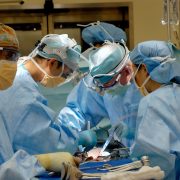University of Texas Southwestern Medical Center
The University of Texas Southwestern Medical Center in Dallas is one of the few American hospitals that treats malignant pleural mesothelioma research and therapy as a priority.
The mesothelioma initiative at UT Southwestern is an integrative part of a larger Lung Disease and Respiratory Disorders specialty that provides those suffering from thoracic diseases like mesothelioma with the most novel treatments and in-depth diagnostic procedures on the market. The staff of the integrative mesothelioma treatment program is comprised of all sorts of medical professionals, such as radiation oncologists, medical oncologists, cardiothoracic surgeons, and nurses.
Together, these professionals collaborate in order to determine the best course of treatment possible. All members of the staff at UT Southwestern are trained in the hospital’s specialized approach to cancer care; lung cancer specialists take advantage of the resources, such the institution’s world class clinical staff and its cutting-edge clinical research program.
Cancer Care at Southwest Medical Center
There are thirteen different cancer treatment initiatives at Simmons Cancer Center; all of them collaborate on a daily basis in order to bring humanity closer towards finding a cure for cancer. The Simmons Cancer is the only NCI (National Cancer Institute) designated facility in the Dallas Area.
These thirteen initiatives are: breast cancer, pediatric cancer, urologic cancer, lung cancer, gynecologic cancer, gastrointestinal cancer, lymphoma, myeloma, leukemia, radiation oncology, cancer genetics, brain cancer and spinal cancer, head and neck cancer, neurofibromatosis, and melanoma and sarcoma.
Mesothelioma and Lung Cancer
At Simmons Cancer Center, the lung cancer sector has extensive familiarity when it comes to the treatment of mesothelioma. In recent years, the number of mesothelioma patients at Simmons has skyrocketed; many attribute this due to the arrival of Dr. Kernstine.
Dr. Kernstine, the current chair and professor of the division of thoracic surgery, is at the forefront of the fight against lung cancer. Kernstine has been treating patients suffering from pleural mesothelioma for years; he is well versed in the two most aggressive treatments for the disease, the pleurectomy/decortication (P/D) and the extrapleural pneumonectomy (EPP).
Dr. Jonathan Dowell, hematology oncology associate professor, works intimately with those diagnosed with thoracic malignancies; this includes patients with mesothelioma. Dr. Dowell is a very active clinical researcher; he specializes in research on small cell and non-small cell lung cancers as well as mesothelioma.
Dr. David Gerber, co-director of the Experimental Therapeutics of Cancer research collective, works on the majority of the neoadjuvant and adjuvant therapy techniques with those suffering from mesothelioma.
Dr. Muhanned Abu-Hijeh has specialized in the treatment of pleural diseases such as mesothelioma, lung cancers, and other various thoracic malignancies for an extended period of time.
Dr. Hak Choy is the current chair of the radiation oncology department at UT Southwestern; his reputation comes from his contribution towards the development of new pharmaceuticals that can be used in multimodal therapies with the newest radiation technologies. Dr. Choy is an expert in image-guided radiation therapy (IGRT) as well as stereotactic body radiation.
Research at Southwest Medical Center
The UT Southwestern Medical Center is home to an Experimental Therapeutics of Cancer department; in this specialized department, research is executed with the aim of understanding how genetic variations affect reactions to different treatment styles and tumor development in different cancers.
Scientists at the medical center review the molecular building blocks of cancers as well as how the variations affect the development of tumors; this helps doctors personalize approaches to treatment for patients at the cancer center. There are other specific research departments that are dedicated to understanding the chemistry of cancer, lung cancer, cancer control, and cancer cell networks. The intention of these specialty departments is to lighten the load of understanding the disease.
Community Engagement
Early screening programs are an essential facet of UT Southwestern’s community engagement initiative. These programs are geared towards screenings for colon cancer and lung cancer. The screening initiative has been extremely successful in the lower echelons of socioeconomic status.
Another initiative at UT Southwestern is monitoring families that are predisposed towards higher risk of uterine cancers and colon cancers; they also monitor families with unique gene mutations that have been linked to breast cancers and ovarian cancers.
